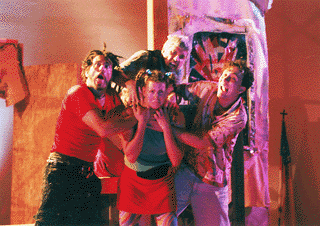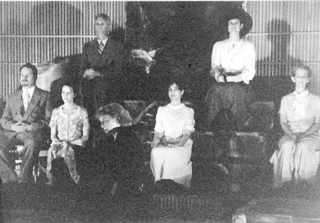Exhibitionism
Godspell '98: All for the Best
Fri., June 5, 1998
through June 7
Running time: 2 hrs

Godspell is kin to those meaningful Seventies musicals sprouting out of the chaos inherent to the late Sixties. With the Vietnam War raging and the blossoming of a socially conscious counterculture, the world was spinning furiously in search of a spiritual epicenter. One product of such dire circumstances is Godspell, a musical that chronicles the teachings of Jesus Christ and the last few days before his crucifixion. Parables about loving your enemy and the importance of charity are told ñ how else? ñ in song and dance as 12 disciples share and act out lessons with sometimes whimsical and sometimes deadly serious themes. In subsequent years, many of the songs, written by Stephen Schwartz, have burrowed their way into the lexicon of musical theatre favorites ñ heartfelt and snappy numbers like "Day by Day" and "All for the Best." For their 40th Anniversary, then, it is appropriate that St. Matthew's Episcopal Church has remounted this icon of Seventies sensibilities, culled from the Gospel of St. Matthew itself, to celebrate. Following a somewhat muddled beginning, in which unidentified characters sing somewhat incoherently about confusing topics, the production plants two feet firmly on the ground with John the Baptist's "Prepare Ye the Way of the Lord," sung with glorious clarity by Stewart Johnson. The production moves solidly onward, with notable numbers including George Farr's smooth, melodious tenor in "All Good Gifts" and the always engaging Janis Stinson's lush, seductive rendition of "Turn Back, O Man." Other unexpected delights abound, from Jason Amato's subtle but effective lighting to the sheer, unflagging earnestness of each cast member. And the visual trick of the play's last few moments, executed seamlessly, is a rare treat. But the production is set in a church, and so some technical problems arise, not the least of which is a few voices that can't make it over a loud in-house drum machine. Director Dennis L. Whitehead has skillfully utilized the rather unpliable space, but the vision of a "Godspell for the Nineties" isn't entirely realized. Part of the appeal of the original musical was the potency of the right message at the right time. And as part of this overarching theme, Jesus and his disciples were portrayed as peace-loving flower children, a reminder that Christianity had first been embraced by a disillusioned fringe culture. Whitehead's production lacks the cohesion of social, spiritual, and religious messages, so that while all the discrete elements are there, they don't come together to make any equally exigent meaning. The cast has good-natured fun with references to Jan and Marsha Brady, Cher, consumer culture, and the high price of movie tickets, but the only visual sign of the times is that Jesus and most of his disciples look like they just returned from a dress rehearsal for Rent. This doesn't make the show any less enjoyable. But in forfeiting the opportunity to make Godspell not only look like the Nineties but also be socially relevant to it, St. Matthew's may find itself (literally) preaching to the converted. ñSarah Hepola
OUR TOWN: PAST CONNECTIONS
AFL/CIO Auditorium
through June 13
Running time: 2 hrs, 30 min

I must be the last person in America who had never seen Our Town. The closest I ever came to actually glimpsing that staple of high school theatre, that cliché of modern stage, that ubiquitous drama so trite and overdone that the mere name elicits knowing groans of exasperation was an episode of Growing Pains I saw in which Mike got the lead role and learned a great deal about life and himself. If, like me, you still remain unschooled in Thornton Wilder's most famous play, it revolves around a quiet, unassuming New Hampshire town. And if, like me, you've never experienced it, you really should. Covering the time from 1901-1913, it is a glimpse at a moment before the world was rent with two world wars, a time when your word was good, when the touch of a girl's hand could send a boy trembling, and plans for the future were sealed by youngsters over an ice cream soda. Through three acts we watch this town and its citizens emerge cautiously into a more industrialized world, navigated by the Stage Manager (gracefully played by Sharon Elmore). As young George (Daniel Mussey) and Emily (Jackie Belvin) fall in love, as they emerge into adults, and as they cope with life's inevitable tragedies, Our Town stresses the connections we share with each other, with our past, with our future, and with the unknown that exists far beyond.
The look and feel of Third Corner's production is right on ñ softly lit, dreamy, vaguely nostalgic, and wide-eyed. And most of the actors manage to deliver the overearnest lines without trespassing into "aw-shucks" hokiness. Especially effective is Jackie Belvin, whose even-handed portrayal of the wistful Emily never wavers in believability. She combines wholesomeness, vulnerability, and genuine hope in a way endemic to that moment of America's past. It is no mistake that Wilder ended his play the year before the outbreak of World War I, when our country's fragile trust in man's goodness would be forever shaken.
The disconcerting part of Our Town, then, is its mystifying assertion, published in the "Director's Notes," that "the participants of the production are of a different time, perhaps the future.... You can call it post-apocalyptic if you want to, but the point is, this could be Yugoslavia, Rwanda, wherever." Small cues are littered throughout the play to indicate this is not necessarily New Hampshire. The starkest of these is the live tableau onstage for audience members to watch before the play begins, a curious collection of ragged, Dickensian children mutely watching a documentary on the Industrial Revolution and eating out of tin cans. A stirring beginning... but to what? Not this play. Instead of enriching the meaning, these serve to undercut its significance, throwing a monkey wrench in each resonant moment. Director Shelby Brammer is hoping to underscore the eternal and universal inherent in Wilder's play, but she accomplishes that without pushing it to illogical extremes. In the end, the post-apocalyptic hook seems superficial, an excuse to produce a play many might say needs a modern twist. If it were up to me, I'd rather see more plays like Our Town ñ sweet, warm, and profound ñ and less blathering on about the apocalypse. ñSarah Hepola








